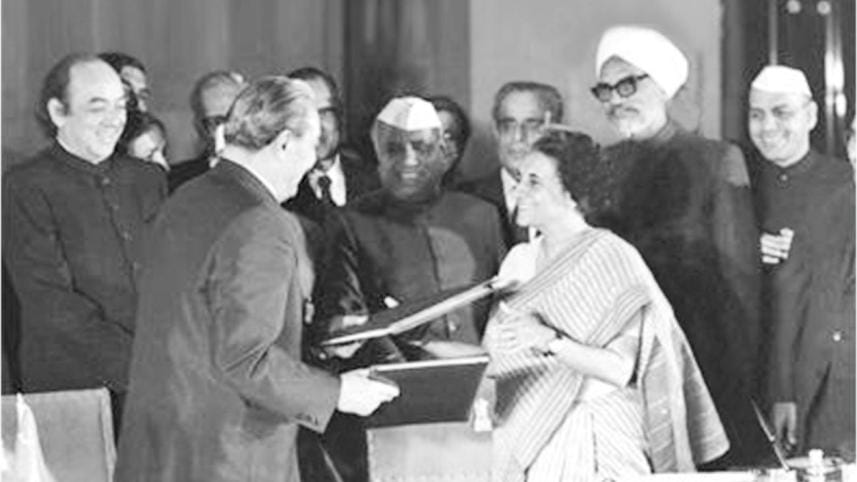''The people of Bangla Desh are united in the fight for their just demands.''

Ramesh Chandra: Madam, the Indo-Soviet Treaty has been acclaimed by the overwhelming majority of the people of India. What would you say could be the reason for this near unanimous welcome?
Indira Gandhi: Friendship between India and the Soviet Union has grown in many directions over the years. In the international arena, we have both worked for peace and have opposed racialism and colonialism. The Soviet Union has helped our programmes for the achievement of self-reliance through developing heavy industry.
International relations have entered an era of rapid change, the range and direction of which is not predictable. Nations are seeking new ties and are cutting across old rigidities. This is a welcome trend. But some countries are taking advantage of these changes to embark upon opportunistic adventures.
We are convinced that the present Treaty will discourage such adventurism on the part of countries which have shown a pathological hostility towards us. Our people look upon the Soviet Union as a friend. That is why the Treaty has received such widespread acclaim in our country.
Ramesh Chandra: What would be its impact on the climate for peace in this part of the world, particularly with reference to the liberation struggle of the people of the Bangla Desh?
Indira Gandhi: To begin with the second part of your question, the struggle in Bangla Desh is between the 75 million people on the one side and the vindictive, cruel and autocratic military regime of Islamabad on the other. The people of Bangla Desh are united in the fight for their just demands. But we know that resentment against military rule is increasing among the people of West Pakistan also, whether they belong to Baluchistan, N.W.F.P. or even the favoured provinces of Sind and Punjab.
Our people, Parliament and Government have extended full sympathy and support to the people of Bangla Desh. We have no quarrel with the people of West Pakistan. The problem is not an Indo-Pakistan one.
The military regime in Islamabad is isolated from its people and is waging war against them. That is why it seeks to divert the attention of the people of Pakistan, as well as of the rest of the world, from the agony of Bangla Desh by attempting to give an Indo-Pakistan complexion to the problem. The threat of war might be an act of desperation, but how can we fail to take note of it? However, we feel that the Treaty will act as a deterrent against any rash adventurism on the part of Islamabad.
But peace does not mean merely the absence of hostilities, nor can there be peace while oppression and injustice prevails. Peace must be based on the fulfilment of the just aspirations of the people.
Ramesh Chandra: You have rightly said that the Treaty is not a departure from the concept of non-alignment, but that it actually strengthens the forces of non-alignment all over the world. Would you kindly elaborate this statement?
Indira Gandhi: While staying out of power blocs, we have sought the friendship of governments of different persuasions. Peaceful co-existence and conviction that war should be ruled out as a means of settling issues, have been the basic guiding principles of our policy. Simultaneously, we have also opposed colonialism and racialism. Many other nations of Asia and Africa have pursued a similar policy. The Soviet Union has extended unreserved respect and support to our policy of non-alignment. This has been incorporated in the Treaty itself.
The word 'non-alignment' has been misinterpreted; that is why such doubts arise. The Treaty does not compromise our non-aligned position.
The national interest of non-aligned countries has to be safeguarded from threats of military adventurism. Security must be achieved in a manner which eschews hegemony or confrontation and ensures lasting peace. This is precisely what the Indo-Soviet Treaty of Friendship, Peace and Co-operation does.
Ramesh Chandra: What is your estimate of the prospects for peace in South-East Asia and West Asia?
Indira Gandhi: Peace in South-East Asia depends on the solution of the problem of Vietnam, Laos and Cambodia. All these three are now interrelated. However, a settlement has to be reached in South Vietnam. There is increasing recognition of the fact that there is no military solution. Recently, the Provisional Revolutionary Government of South Vietnam made certain proposals. The crucial point there is that of the withdrawal of foreign forces, and more specially of American forces. I have no doubt that if this withdrawal is made within a certain fixed time-frame, then South Vietnam could be left to work out its future without military or political interference from outside. Sooner or later, the Vietnam problem will have to be settled along these lines.
There is at present a stalemate in West Asia. However, potentially the situation is dangerous. The greater the delay in finding a solution, the more difficult the problem will become. The directions in which a solution has to be sought are laid down in the U.N. Security Council Resolution of 1967. President Anwar Sadat has made a series of proposals. In our view, they deserve careful consideration.
Source: Ministry of External Affairs, Government of India



 For all latest news, follow The Daily Star's Google News channel.
For all latest news, follow The Daily Star's Google News channel.
Comments